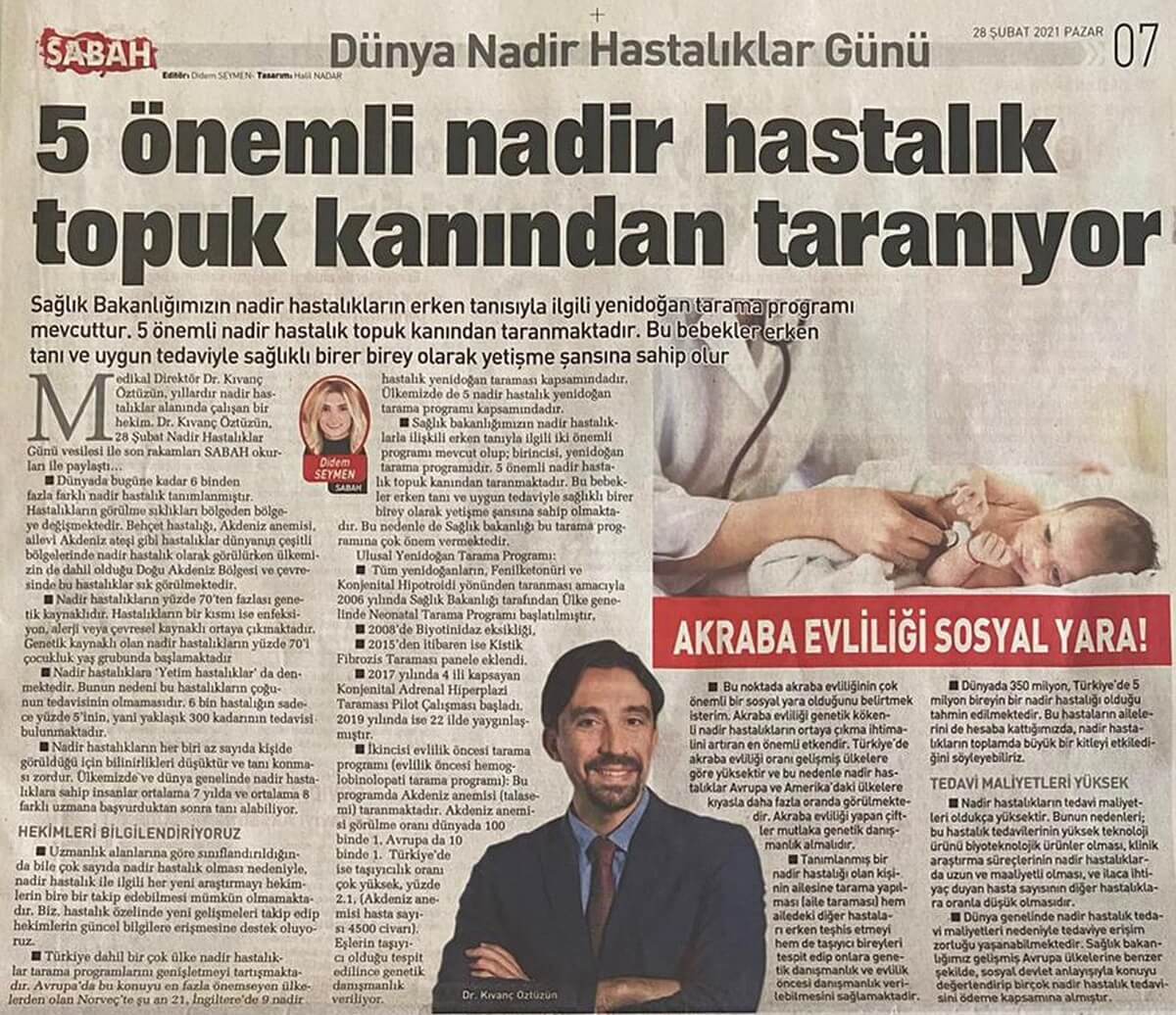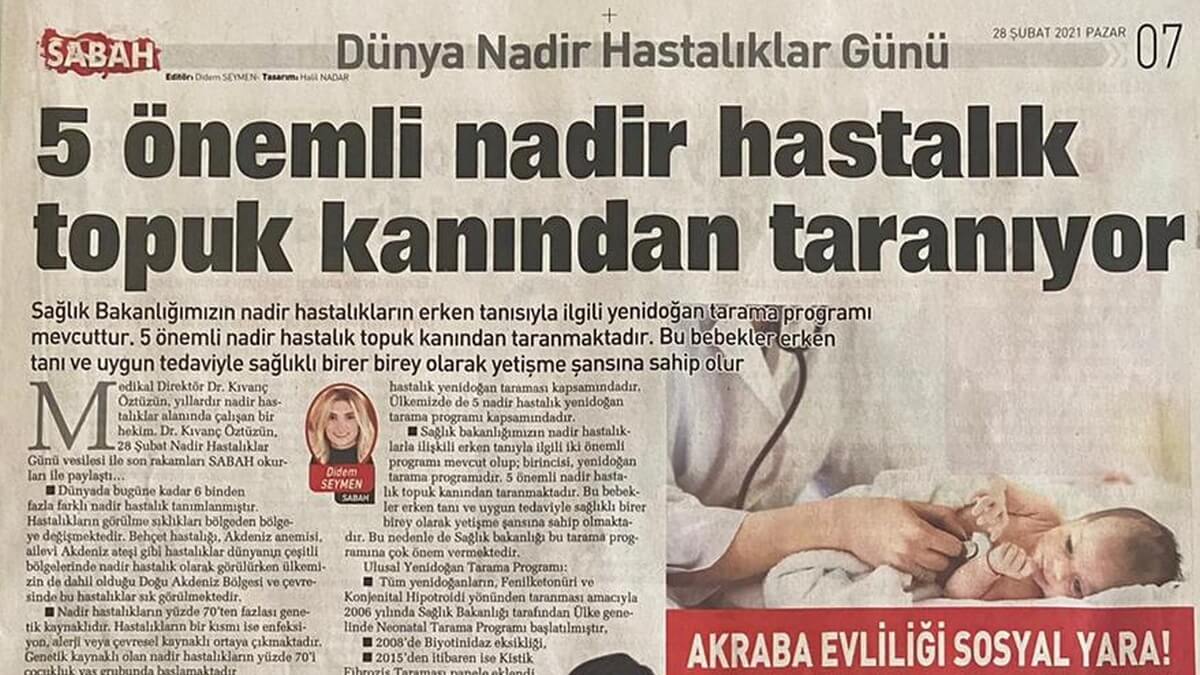Medical Director Dr. Kıvanç Öztüzün is a physician who has been working in the field of rare diseases for years. Dr. Kıvanç Öztüzün shared the latest figures with SABAH readers on February 28th, Rare Diseases Day…

To date, more than 6,000 different rare diseases have been identified in the world. The incidence of diseases varies from region to region. While diseases such as Behçet’s disease, Mediterranean anemia, familial Mediterranean fever are seen as rare diseases in various regions of the world, these diseases are frequently seen in and around the Eastern Mediterranean Region, including our country. More than 70 percent of rare diseases are of genetic origin. Some of the diseases are caused by infection, allergy or environmental origin. 70 percent of rare genetic diseases start in childhood. Rare diseases are also called “orphan diseases”. This is because most of these diseases have no cure. Only 5 percent of 6,000 diseases, about 300, have a cure. Since each rare disease is seen in a small number of people, their awareness is low and diagnosis is difficult. In our country and around the world, people with rare diseases can be diagnosed in an average of 7 years and after visiting an average of 8 different specialists.
INFORMING PHYSICIANS
Even when classified according to areas of expertise, it is not possible for doctors to personally follow every new research due to the high number of rare diseases. We support doctors by monitoring new developments specific to the disease and providing access to up-to-date information.
Many countries, including Turkey, are discussing the expansion of rare disease screening programs. Norway, one of the countries that values this issue the most in Europe, currently has 21 rare diseases in the newborn screening program, while England has 9. In our country, there are 5 rare diseases in the newborn screening program.
Our Ministry of Health has two important programs related to early diagnosis of rare diseases, the first of which is the newborn screening program. Five important rare diseases are screened from heel blood. These babies have the chance to grow up as healthy individuals with early diagnosis and appropriate treatment. Therefore, the Ministry of Health places great importance on this screening program.
National Newborn Screening Program:
- The Neonatal Screening Program was initiated across the country by the Ministry of Health in 2006 in order to screen all newborns for Phenylketonuria and Congenital Hypothyroidism,
- Biotinidase deficiency in 2008,
- As of 2015, Cystic Fibrosis screening has been added to the panel.
- The Congenital Adrenal Hyperplasia Screening Pilot Study, which covered 4 provinces, started in 2017. In 2019, it was widespread in 22 provinces.
The second one is the pre-marriage screening program (pre-marriage hemoglobinopathy screening program): In this program, Mediterranean anemia (thalassemia) is screened. The incidence of Mediterranean anemia is one in 100,000 worldwide, one in 10,000 in Europe. In Turkey, the carrier rate is very high, 2.1%, (the number of patients with Mediterranean anemia is around 4,500). When both spouses are carriers, genetic counseling is provided.
CONSANGUINEOUS MARRIAGE IS A SOCIAL WOUND
I would like to mention that consanguineous marriage is a significant social wound at this point. Consanguineous marriage is the most important factor that increases the likelihood of genetic rare diseases. The rate of consanguineous marriage in Turkey is higher compared to developed countries, and as a result, rare diseases are seen more frequently than in European and American countries. Couples who have consanguineous marriages should definitely receive genetic counseling. Screening of a family with a defined rare disease (family screening) can not only detect other patients early, but also identify carriers and provide them with genetic counseling and pre-marriage counseling. It is estimated that there are 350 million people with a rare disease worldwide and 5 million in Turkey. When we also take the families of these patients into consideration, we can say that rare diseases affect a large population in total.
HIGH TREATMENT COST
The treatment costs of rare diseases are very high. The reasons for this are that these disease treatments are high-tech biotechnological products, the clinical research process is long and expensive in rare diseases, and the number of patients needing medication is low compared to other diseases. Access to treatment for rare diseases can be difficult due to the high cost of treatment worldwide. Our Ministry of Health, like developed European countries, evaluates the issue with a social state mentality and has included the treatment of many rare diseases in its reimbursement coverage.
Sabah Gazetesi – 5 Önemli Nadir Hastalık Topuk Kanından Taranıyor



